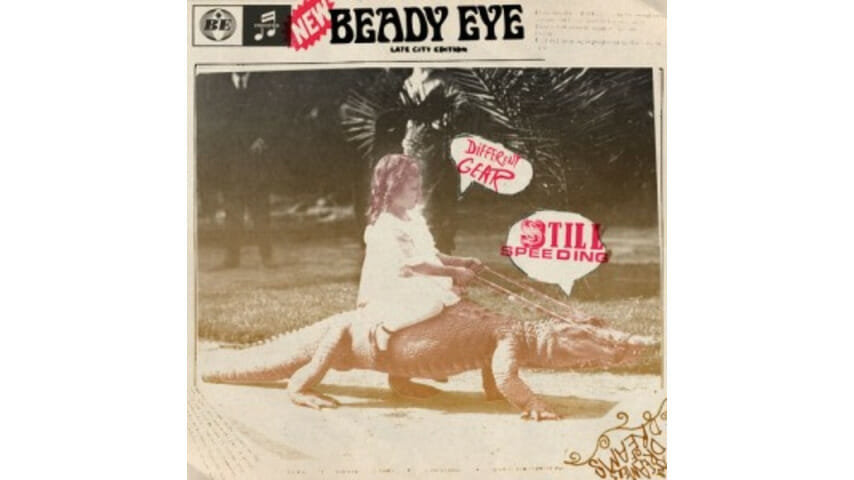
I, along with my fellow freshmen English composition classmates, learned a lot about plagiarism when we entered college: It’s taboo. Don’t do it. You’ll get kicked out if you do. Even more importantly, though, it’s dishonest. The Gallagher brothers must have missed orientation—they’ve based their entire careers on the concept.
From day one, Liam and Noel wanted to be “The Next Beatles,” and luckily for music fans, that resulted in some classic mid-’90s Oasis albums like Definitely Maybe and What’s the Story, Morning Glory?, where their unabashed pursuit of the ultimate rock song led them to honest, refreshing guitar anthems in which anything truly seemed possible. Flash-forward a decade-and-a-half—the ranks have been diminished by one, with principal songwriter Noel departing after finally having enough of the brotherly disputes which had, for years, clogged the music press and distracted from the real point: the music.
So with the songwriter gone from a band who peaked with their sophomore full-length, a new Oasis album would be a slightly frightening thought. Good news, though: as the remaining members (vocalist Liam Gallagher, bassist/guitarist Andy Bell, guitarist/keyboardist Gem Archer, and drummer Chris Sharrock) would tell you, this is not Oasis. This is Beady Eye. A different band. A fresh start.
But if there’s one universal truth to emerge from the stripped-down rock tunes on Beady’s Eye’s debut album, Different Gear, Still Speeding, it’s “Once a Gallagher, Always a Gallagher.” Different Gear basically sounds like Oasis returning to its less complicated roots, stripping back the heavily overdubbed layers of their curtain call, 2008’s Dig Out Your Soul. Beady Eye aren’t here to dick around—they’re here to rock. And it would be a lie to say they’ve failed in that regard; this is an album of live, full-band rock ‘n’ roll energy, built on Rickenbacker crunch and Ludwig thump. There’s no time for frills—Gallagher and company are making up for lost time.
The problem is that most of the songs, in terms of either pure songwriting or inventiveness, just don’t stack up. While Noel’s lyrics in Oasis were never brilliant read straight from the page, they did harbor a simple, poetic honesty that cut through the bullshit dominating ‘90s radio. Tracks like “Don’t Look Back in Anger” might not have approached Bob Dylan territory, but they were honest and heartfelt, and when it all clicked, the songs were much greater than the sum of their parts. That’s certainly not the case with any of the tracks here. Liam relies on forced, pseudo-psychedelic imagery that The Beatles would have found corny even in the ‘60s (when that kinda stuff was cool). On the otherwise fairly effective riff-rocker “Wind Up Dream,” Gallagher unfurls one of his trademark John Lennon-aping melodies (and the Lennon filler staple “Come o-oo-oon!”), but his words (“It’s just a wind-up dream, so don’t wake me up / ‘Cause I like what I see with my eyes shut!”) certainly aren’t doing him any favors.
And speaking of The Beatles, Different Gear continues the Gallagher quest for the perfect Lennon impression. It’s yet to be found. The songs are stark and dry in terms of both arrangements and production, but there’s one consistency—a wealth of references from every Lennon melody in his discography. On “Beatles and Stones,” no one’s bothering to hide from the accusations. Refreshing honesty, sure, but it actually borrows the bassline from The Who’s “My Generation” and mimics a Kinks-y chorus.
On “Kill for a Dream,” a gorgeous, shockingly well-recorded acoustic ballad, Beady Eye deliver their most convincing argument for continuing on post-Noel. It’s a tender reflection on both forgiveness and the world at large, an ironic highlight considering the band’s obvious goal to “rock out.” In a heartbroken, hungover haze, Liam sings, “Life’s too short not to forgive/ You can carry regrets, but they won’t let you live/ I’m here if you want to call, staring at a spot on the wall.” It’s a devastating wave of emotion on an album that mostly avoids matters of the heart. For all we know, Liam might be writing fictitiously. But it sounds like a plea for brotherly reconciliation—that is if Noel’s even listening.